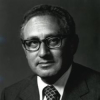Henry A. Kissinger

Henry A. Kissinger
Henry Alfred Kissingeris an American diplomat and political scientist. He served as National Security Advisor and later concurrently as United States Secretary of State in the administrations of presidents Richard Nixon and Gerald Ford. For his actions negotiating the ceasefire in Vietnam, Kissinger received the 1973 Nobel Peace Prize under controversial circumstances, with two members of the committee resigning in protest. Kissinger later sought, unsuccessfully, to return the prize. After his term, his advice has been sought by world leaders...
NationalityGerman
ProfessionStatesman
Date of Birth27 May 1923
CountryGermany
We are all the President's men.
It is frankly a mistake of amateurs to believe you can gain the upper hand in a diplomatic negotiation.
Some of the critics viewed Vietnam as a morality play in which the wicked must be punished before the final curtain and where any attempt to salvage self-respect from the outcome compounded the wrong. I viewed it as a genuine tragedy. No one had a monopoly on anguish.
People think responsibility is hard to bear. It's not. I think that sometimes it is the absence of responsibility that is harder to bear. You have a great feeling of impotence.
Intelligence is not all that important in the exercise of power, and is often, in point of fact, useless.
Covert action should not be confused with missionary work.
Why should we flagellate ourselves for what the Cambodians did to each other?
In his essay, ‘Perpetual Peace,’ the philosopher, Immanuel Kant, argued that perpetual peace would eventually come to the world in one of two ways, by human insight or by conflicts and catastrophes of a magnitude that left humanity no other choice. We are at such a juncture.
President Nixon in his inaugural address indicated that he wanted an era of negotiation. Our reasoning was that whatever our ideological differences, whatever our geopolitical differences, we were condemned to coexistence by nuclear weapons.
History knows no resting places and no plateaus
I am being frank about myself in this book. I tell of my first mistake on page 850.
Behind the slogans lay an intellectual vacuum.
History is the memory of States.
Before there was the Soviet Union that could inflame matters. Now you have states not as powerful as the Soviet Union, but states like Iraq, like Iran, and to some extent Syria, having made it possible for some of these groups to operate. So it is a very difficult situation.